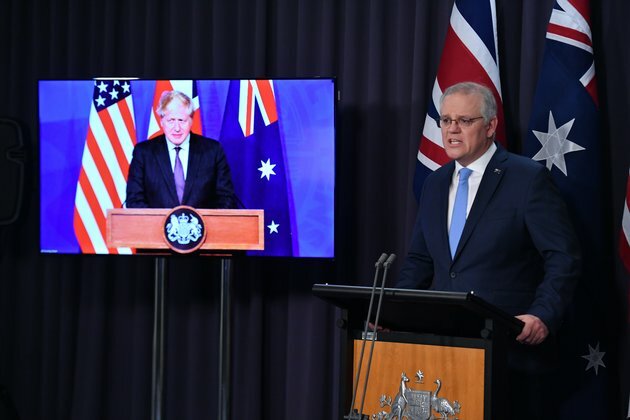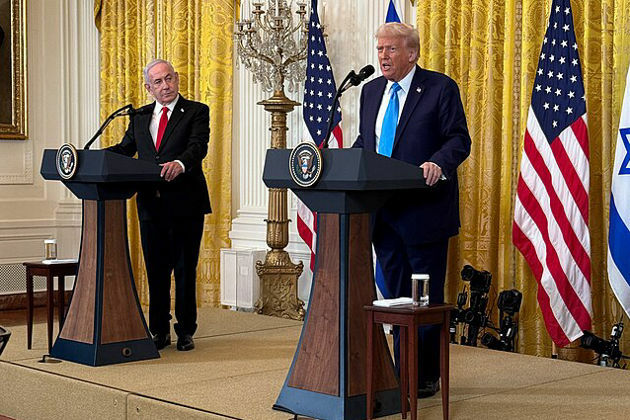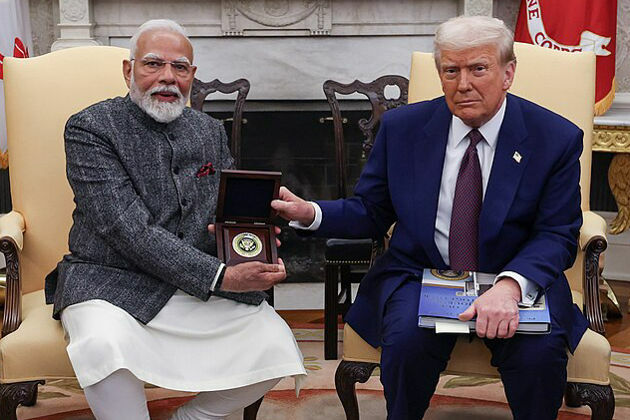AUKUS: is an arms race with China the price of 'Global Britain'?
The Conversation
17 Sep 2021, 00:10 GMT+10

A new military alliance between the US, Australia and the UK will, for the first time, provide Australia with nuclear-powered submarines.
While not officially aimed at another country, the "AUKUS" deal aims to deter China's growing influence in the South Pacific. While many policymakers believe deterrence is the only way to protect the west's interests, this strategy carries significant risks to the UK and its allies.
AUKUS is a direct response to China's recent efforts to modernise and expand its nuclear capabilities. Western democracies are also concerned about China's growing involvement in the contested territories on the South China Sea.
The alliance reflects the view, commonly held by foreign policymakers, that China's actions are a direct challenge to American and British influence in the region and must be actively resisted. But this view has been challenged by international relations scholars and foreign policy analysts. They believe that the west should engage China in diplomacy rather than resist it.
Some commentators and policymakers believe that two countries with nuclear weapons would never attack each other for fear of mutual annihilation. A key - and dangerous - assumption of this belief is that people are rational agents.
This assumption ignores that people often make decisions based on emotional responses, rather than rational calculations. The Cuban Missile Crisis of 1962 - and how close the US and Russia were to launching nuclear strikes against each other - is an example of this. The decision to deploy nuclear weapons was a result of a series of misunderstandings and perceptions, rather than an actual threat posed by either side. A Russian officer's refusal to follow orders is the only reason the cold war did not end up in a nuclear disaster.
While a defensive response to China's nuclear expansion is understandable, it risks creating the so-called "security dilemma". This is a situation where one party, worried about its security, improves its military capabilities. But instead of solving the security issues, the actions escalate the conflict with other parties, producing an outcome which all were trying to avoid.
While AUKUS is a clear attempt to deter China from further expansion, it is likely to have the opposite effect. In response to perceived threat from the western allies, China is more likely to make further efforts to improve its military capability in response. This could lead to a situation very similar to the US-Russian arms race during the cold war.
When Chinese and western policymakers talk past each other rather than engage in a constructive dialogue, tensions are likely to rise. During former US president Donald Trump's administration, instead of engaging with China on its questionable economic practices, the US levied tariffs on Chinese imports, leading to a US-China trade war that continues to this day.
Britain's involvement
If the strategy of nuclear deterrence bears so many risks, why is the UK involved in AUKUS? After all, the US has the ability to provide Australia with all the technology and logistic support in needs to develop nuclear-powered submarines. Yet, according to recent news reports, the UK took the lead in making this partnership a reality, despite the fact that it will contribute much less than the US.
Post-Brexit Britain is keen to reestablish itself as a global player. It is also looking to improve its relationship with the US which has been strained by the hasty withdrawal of US troops from Afghanistan last month.
AUKUS is an opportunity for the UK government to convince the world, and its electorate, that Britain does not need the EU, and that "Global Britain" can be a key player on the international stage.
What's the alternative?
It is clear that the relationship between China and the west is strained by mutual suspicion and hostile exchanges. While China fears that the west poses a threat to its domestic political regime, western nations worry that an expansionist China will become more aggressive in the coming years.
The lack of sustained diplomatic engagement with China means that policymakers are likely to continue misinterpreting each other's actions.
A much better solution would be to engage China on its current nuclear armament policy. The Arms Control Association, a US nonpartisan organisation promoting effective arms control, suggests that western nuclear powers could use their experience of post-cold war diplomacy to develop a system where states report on their nuclear weapons holdings to each other.
More ambitiously, the UK and its allies should engage China on nuclear disarmament - not provide it with an excuse to continue its nuclear expansion.
Author: Barbara Yoxon - Lecturer in International Politics, Lancaster University 
 Share
Share
 Tweet
Tweet
 Share
Share
 Flip
Flip
 Email
Email
Watch latest videos
Subscribe and Follow
Get a daily dose of Asia Bulletin news through our daily email, its complimentary and keeps you fully up to date with world and business news as well.
News RELEASES
Publish news of your business, community or sports group, personnel appointments, major event and more by submitting a news release to Asia Bulletin.
More InformationInternational
SectionTragedy in Spain: Diogo Jota and his brother die in car accident
MADRID, Spain: Liverpool footballer Diogo Jota and his younger brother, André Silva, have died in a car accident in Spain. Spanish...
Early heatwave grips Europe, leaving 8 dead and nations on alert
LONDON, U.K.: An unrelenting heatwave sweeping across Europe has pushed early summer temperatures to historic highs, triggering deadly...
U.S. military, China, Russia in Space race
President Donald Trump's plans to build a space-based Golden Dome missile defense shield have drawn immediate criticism from China,...
Trump wins $16 million settlement from Paramount over CBS Harris edit
NEW YORK CITY, New York: Paramount has agreed to pay US$16 million to settle a lawsuit brought by U.S. President Donald Trump over...
British PM faces major party revolt over welfare reforms
LONDON, U.K.: British Prime Minister Keir Starmer won a vote in Parliament this week to move ahead with changes to the country's welfare...
White House meeting between Trump, Netanyahu on July 7
WASHINGTON, D.C.: President Donald Trump will meet Israeli Prime Minister Benjamin Netanyahu at the White House on Monday. President...
Business
SectionEngine defect prompts Nissan to recall over 443,000 vehicles
FRANKLIN, Tennessee: Hundreds of thousands of Nissan and Infiniti vehicles are being recalled across the United States due to a potential...
Microsoft trims jobs to manage soaring AI infrastructure costs
REDMOND, Washington: Microsoft is the latest tech giant to announce significant job cuts, as the financial strain of building next-generation...
Stocks worldwide struggle to make ground Friday with Wall Street closed
LONDON UK - U.S. stock markets were closed on Friday for Independence Day. Global Forex Markets Wrap Up Friday with Greeback Comeback...
Nvidia briefly tops Apple’s record in AI-fueled stock rally
SANTA CLARA, California: Nvidia came within a whisker of making financial history on July 3, briefly surpassing Apple's all-time market...
ICE raids leave crops rotting in California, farmers fear collapse
SACRAMENTO, California: California's multibillion-dollar farms are facing a growing crisis—not from drought or pests, but from a sudden...
Trump signals progress on India Trade, criticizes Japan stance
WASHINGTON, D.C.: President Donald Trump says the United States could soon reach a trade deal with India. He believes this deal would...













